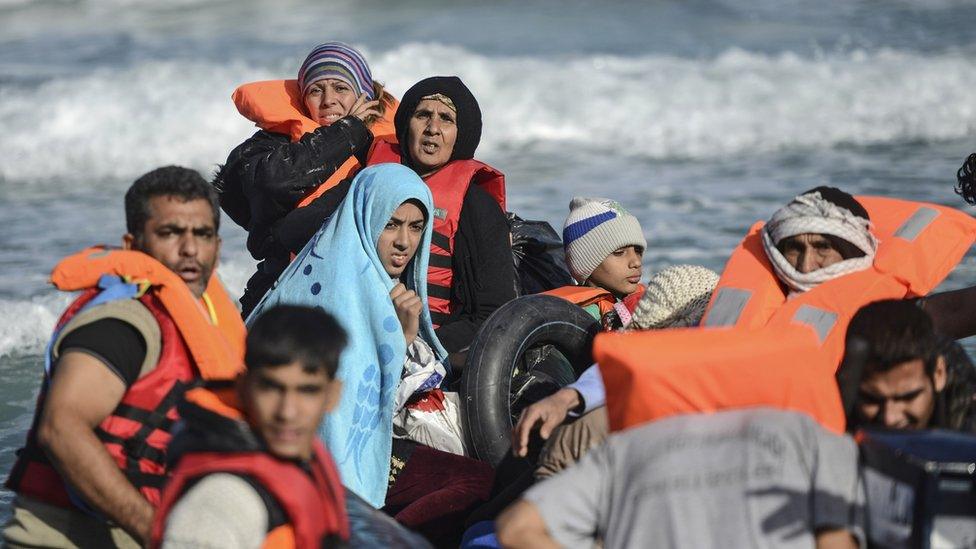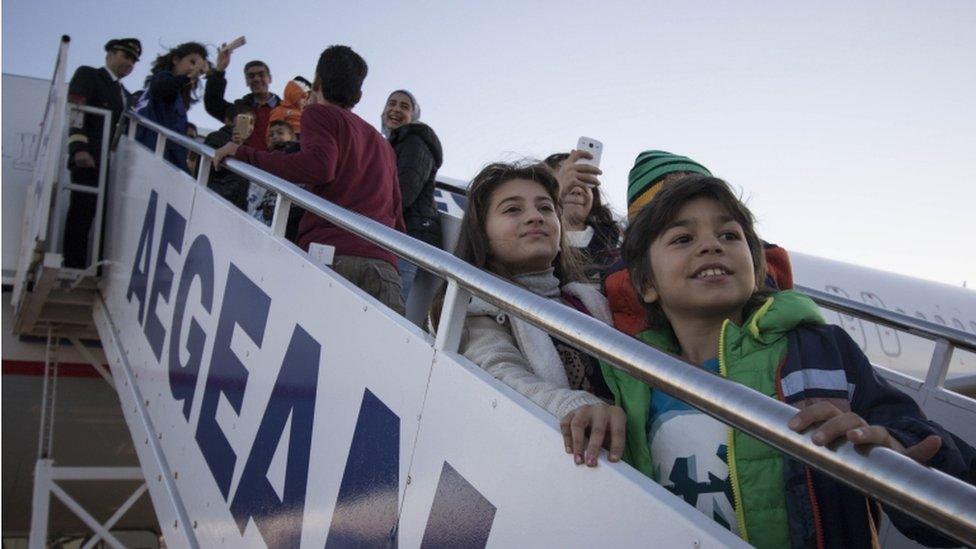Migrant crisis: Three million expected to reach EU by 2017
- Published

Chios, Greece: Every day thousands risk their lives on voyages to Greek islands
Three million migrants are likely to arrive in Europe by 2017 as the record influx via the Mediterranean continues, the European Commission says.
The EU's executive arm said the influx would have a "small but positive" effect on EU economic output, raising GDP by 0.2-0.3%.
The influx will raise the EU population by 0.4%, the Commission forecasts, taking account of failed asylum claims.
The flow of Syrian refugees to Europe shows no sign of abating, the UN says.
The weather in the Aegean Sea has got rougher with the onset of winter. But Peter Sutherland, UN Secretary-General Ban Ki-moon's special representative on migration, said Syrians were not put off by that.
The Syrian war "is driving people to desperation in terms of leaving and it will continue in its effects", he told the BBC.
"This is now a global responsibility, but it is a particular European responsibility," he said.
'5,000 daily'
Conflicts and abuses in Iraq, Afghanistan, Eritrea and Somalia are also pushing people towards Europe.
The flow of refugees and other migrants from Turkey to Greece is expected to continue at a rate of 5,000 daily this winter, the UN refugee agency UNHCR says.

On Wednesday the EU began relocating some Syrian refugees from Greece to Luxembourg
Delivering the EU's autumn economic forecast, external, EU Economic Commissioner Pierre Moscovici said extra public spending and the extra labour supply from recognised refugees would lead to a small GDP rise in the EU as a whole.
However, the Commission cautioned that "the uncertainty surrounding the influx thus far and its future development is substantial".
'Dire prediction'
Commenting on the three million figure given by the Commission, UKIP leader Nigel Farage said "nothing illustrates the need to be out of the EU and to restore proper border controls more than this dire prediction".
The UK Independence Party says that inside the EU the UK is powerless to stop immigration from other EU countries.
The Commission said the figure of three million was an assumption rather than a prediction and included those who had already arrived in 2015.

UN refugee officials say, external more than 750,000 migrants have arrived in the EU by sea this year, up from 282,000 in total in 2014.
The vast majority have arrived in Greece (608,000), which has become the most common destination. Some 140,000 have arrived in Italy in 2015.
Most of the migrants head for Germany, hoping to get asylum there. German officials say their country is likely to host at least 800,000 new migrants this year, and the total could reach 1.5 million.
Sweden has the highest share of refugees per head of population in the EU. The extra cost in public spending is likely to be nearly 0.5% of GDP this year, the Commission says, adding that "the corresponding positive effects on growth would be somewhat smaller".

A note on terminology: The BBC uses the term migrant to refer to all people on the move who have yet to complete the legal process of claiming asylum. This group includes people fleeing war-torn countries such as Syria, who are likely to be granted refugee status, as well as people who are seeking jobs and better lives, who governments are likely to rule are economic migrants.
